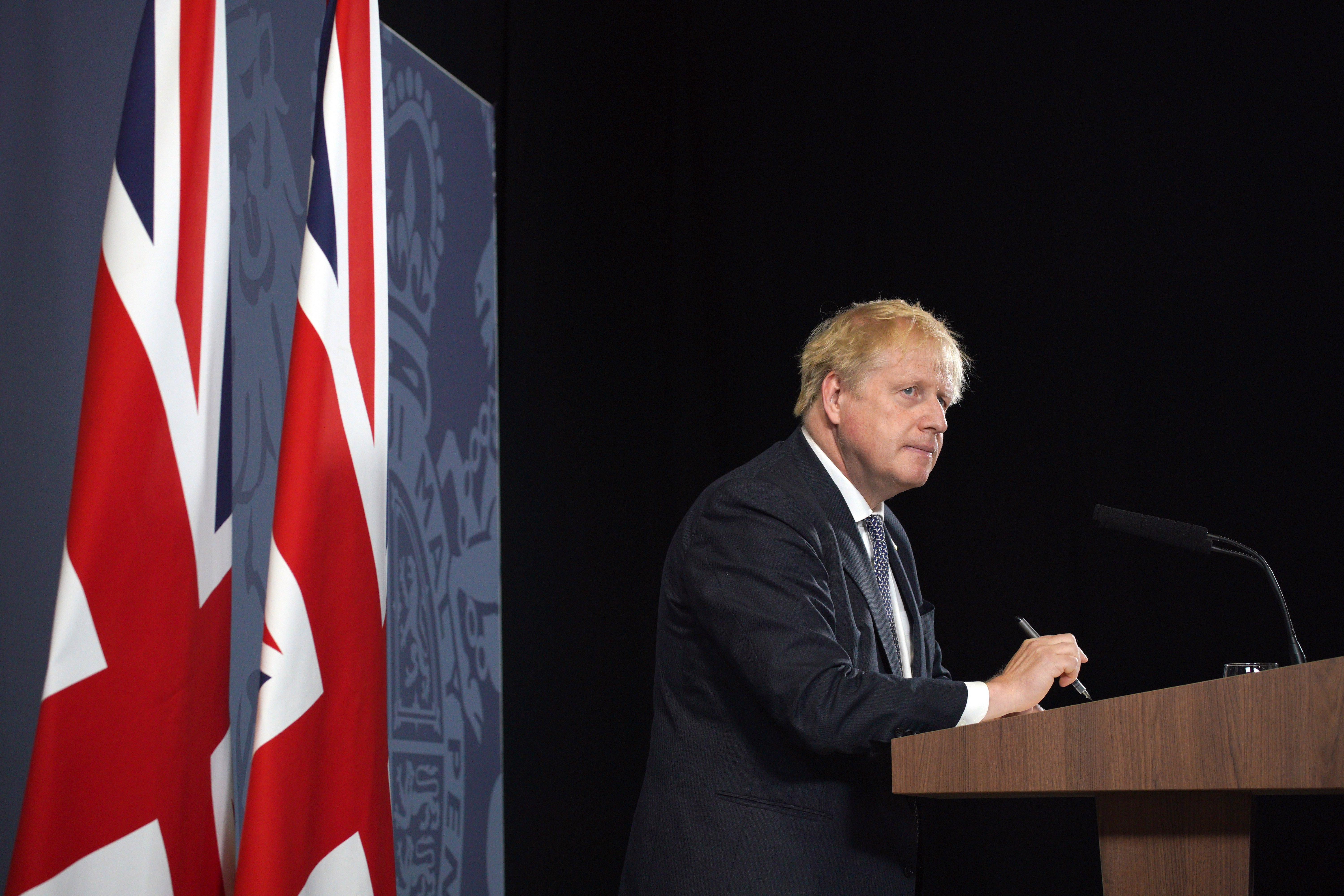Boris Johnson says plan to amend Northern Ireland Protocol is ‘not a big deal’
Ireland’s Foreign Affairs Minister Simon Coveney said the plan would “ratchet up” tension and breach the UK’s international commitments.

Boris Johnson insisted a plan to effectively override parts of the Brexit deal with Brussels was “not a big deal” as he was warned the move would “deeply damage” relations with the European Union and Ireland.
The Bill to amend the Northern Ireland Protocol unilaterally will be introduced in Parliament on Monday amid controversy over whether the legislation will break international law.
Ireland’s Foreign Affairs Minister Simon Coveney said the plan would “ratchet up” tension and breach the UK’s international commitments.
But Mr Johnson insisted the legislation would introduce “relatively simple” bureaucratic changes and warned it would be a “gross overreaction” if Brussels sought to retaliate by triggering a trade war.
The European Union is keeping its options open on how to respond to any move by the UK Government to rip up parts of the agreement signed by Mr Johnson on Northern Ireland’s post-Brexit trading arrangements.
Irish premier Micheal Martin said it is regrettable that the UK is to renege on an international treaty.
Mr Martin also rejected assertions by the British Government that the EU has not been flexible during negotiations.
“It’s very regrettable for a country like the UK to renege on an international treaty,” he said.
“I think it represents a new low point, because the natural expectation of democratic countries like ourselves, the UK and all across Europe, is that we honour international agreements that we enter into.
“This agreement was ratified by British Parliament, it was approved by the British Prime Minister.
“I’ve had this discussion with him and, in our view, the only way to resolve issues around the operation of the protocol is to have substantive negotiations between the UK and the EU.
“We do not accept the presentation by the British Government and certain ministers to the effect that the EU is inflexible.
“That is most definitely not the case and the EU has been very proactive in the last year in endeavouring to seek solutions to issues around the operation of the protocol.”
He called on the British Government to enter into negotiations and discussions to resolve the issues.
Foreign Secretary Liz Truss briefed Mr Coveney about the legislation in a call on Monday.
A spokesman for Ireland’s Department of Foreign Affairs said Mr Coveney told the Foreign Secretary that “publishing legislation that would breach the UK’s commitments under international law, the Brexit Withdrawal Agreement and Northern Ireland Protocol is deeply damaging to relationships on these islands and between the UK and EU”.
The plan marked a “particular low point in the UK’s approach to Brexit, especially as Ms Truss has not engaged with negotiations with the EU in any meaningful way since February”, the spokesman said.
Mr Coveney used a Twitter post to suggest the UK was seeking to “deliberately ratchet up tension with an EU seeking compromise”.
As well as her talks with Mr Coveney, Ms Truss also spoke to European Commission vice-president Maros Sefcovic about the UK Government’s action.
In a sign of the UK’s frustration at Brussels’ stance, she said: “Our preference is a negotiated solution, but the EU must be willing to change the protocol itself.”
UK Government sources said Ms Truss was not “picking a fight” with the EU but was focused on preserving the Belfast/Good Friday Agreement and Brussels’ refusal to alter the protocol meant unilateral action was required.
The legislation will give ministers powers to override elements of the protocol, which was jointly agreed by Mr Johnson’s Government and the EU as part of the Brexit Withdrawal Agreement to keep the Irish land border free-flowing.
The arrangements instead require regulatory checks and customs declarations on goods moving between Great Britain and Northern Ireland, because they could flow through the open border with Ireland into the EU’s single market.
Unionists in Northern Ireland are vociferously opposed to the international treaty, claiming it has undermined the region’s place within the United Kingdom.
The DUP has blocked the formation of a new power-sharing government at Stormont following last month’s Assembly election in protest at the protocol.
Mr Johnson told LBC Radio: “What we have to respect – this is the crucial thing – is the balance and the symmetry of the Belfast/Good Friday Agreement.
“We have to understand there are two traditions in Northern Ireland, broadly two ways of looking at the border issues. One community at the moment feels very, very estranged from the way things are operating and very alienated.
“We have just got to fix that. It is relatively simple to do it, it’s a bureaucratic change that needs to be made.
“Frankly, it’s a relatively trivial set of adjustments in the grand scheme of things.”
Mr Johnson disagreed with claims that the move breaks international law, arguing that “our higher and prior legal commitment as a country is the Belfast/Good Friday Agreement and to the balance and stability of that agreement”.
The legislation is expected to face opposition in the Commons – including from some within the Tory ranks – and ministers will face an even tougher battle in the Lords.
The Financial Times reported that an internal note had been circulating among Tories opposed to the Bill, which said: “Breaking international law to rip up the Prime Minister’s own treaty is damaging to everything the UK and Conservatives stand for.”
The Northern Ireland Protocol Bill will see the Government reduce the checks on the movement of goods across the Irish Sea.
This could include establishing a “green lane” to remove all customs processes for goods moving within the United Kingdom and enable the frictionless movement of agri-food goods staying in Northern Ireland.
It could also see businesses in Northern Ireland given the ability to choose whether to follow UK or EU regulations, depending on who they are trading with.
Bookmark popover
Removed from bookmarks